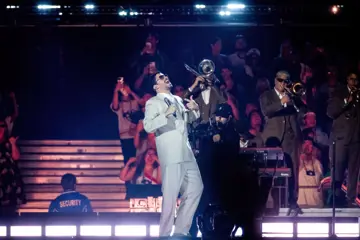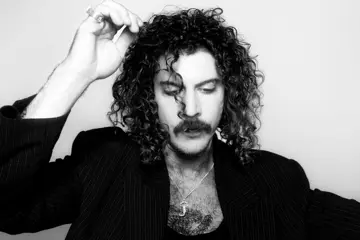Billionaire CEO David Siegel made news this weekw by sending out a mass memo to all his employees that tried to blackmail them into voting for the human excrement Mitt Romney; saying that Barack Obama's re-election would directly threaten their jobs. Siegel is one of the two 'stars' of The Queen Of Versailles, Lauren Greenfield's portrait of grotesque American excess; in which the couple build the biggest residential home in the world - a 90,000 square-foot monstrosity inspired by Versailles - on the eve of the global economic crisis; this half-completed palace a symbol of the last-days-of-the-Roman-Empire spirit of contemporary America. And, as well as being one of the 'stars' of the film - alongside his former-beauty-queen trophy-wife, Jackie - Siegel is also suing Greenfield.
“He issued a defamation suit a week before Sundance, when he hadn't even seen the film,” Greenfield says. “It was on the basis of the press-release which called it a 'riches to rags' story. He took umbrage with that term, without actually realising that those words came from his own mouth during the filming. So, it's not a suit with any merit. And, on the other hand, Jackie – to whom David is still happily married – is actively promoting the film, and has come to festivals and done interviews alongside me. And when the movie opened in Orlando, David and Jackie booked out the whole theatre, and arrived in a party bus with all their friends and family, and threw a huge party. So, the whole lawsuit is pretty frivolous.”
Greenfield started out as a photographer “focusing on sociological themes about American culture”, including one ongoing project “about wealth and consumerism and the American dream”. She was photographing Donatella Versace when she met Jackie, heard about her plans to build her own Versailles, and threw herself into the documentary. “I had long been interested in the connection between the house and the American dream,” Greenfield explains, “and how houses had grown bigger and bigger, and become not just a place to raise your family, but an expression of success and identity.”
Initially, the film plays like reality television – the schadenfreude of laughing at the nouveau riche in all their garish, tasteless idiocy – before becoming a weighty thematic portrait of “the supersizing of the American dream”; a “morality tale on the consequences of living beyond our means”. It's especially resonant given Siegel made his fortune shilling timeshare; that ultimate symbol of people with little money reaching for big dreams.
Don't miss a beat with our FREE daily newsletter
“When I started making the film, I didn't even know what David did, I just knew he was rich,” Greenfield admits. “But, after the crash, timeshare became an important part of the story because it was such an incredible symbol of the sub-prime mortgage crisis... He was taking on too much debt whilst encouraging others to take on too much debt, and that made him a really compelling character; because he was both victim and perpetrator.”
The Siegel mega-mansion is abandoned mid-film, its half-finished edifice its own symbol; and though Siegel has recently made noise about finishing its construction, it would only ever be to sell the property, and a buyer may never come. “When they had to put their house on the market,” Greenfield says, “it was clear that their story mirrored – in very large, grotesque proportions – the economic crisis, and it was really an allegory for the over-reaching of America.”
WHAT: The Queen Of Versailles
WHEN & WHERE: Thursday 18 October to Sunday 28, ACMI Cinemas















